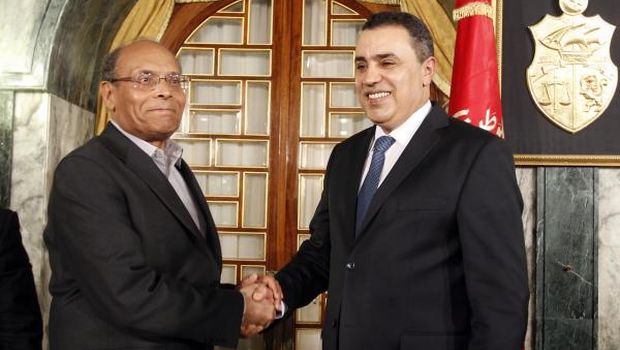
Tunisian President Moncef Marzouki (L) shakes hands with Tunisia’s Prime Minister-designate Mehdi Jomaa after Jomaa spoke during a news conference in Tunis January 26, 2014. (REUTERS/Zoubeir Souissi )
The formation of an interim government of technocrats to guide the country to new elections was an important stage in resolving a political crisis that began last year between Islamists and the opposition following the assassination of an opposition politician.
The latest hiccup in Tunisia’s transition comes as the elected constitutional assembly is set to vote on the new constitution, which has been two years in the making and sets the basis for a new democratic state.
Tunisians overthrew their long-ruling dictator in 2011, inspiring pro-democracy uprisings around the region. Building a new democracy however has been marked by long delays, social unrest and terrorist attacks.
Interim Prime Minister Mehdi Jomaa, in an announcement just after midnight on the day he was set to present his new government of technocrats, said that talks needed to continue to find consensus, particularly over position of interior minister, currently held by Lotfi Ben Jeddou.
“It is not a question of personalities but we should not disturb the balance of the security apparatus,” he said.
The opposition, which blames Ben Jeddou for not doing enough to prevent the assassination of the left-wing politician last year, is demanding a new figure.
Jomaa was tasked on Jan. 10 with forming a new government and he will have a second chance and two more weeks to come up with a new cabinet or a new interim prime minister will be found.
“This should just take one or two days and Jomaa is the closest to becoming the next head of government,” said Adnan Mancer, the spokesman for the presidency.
